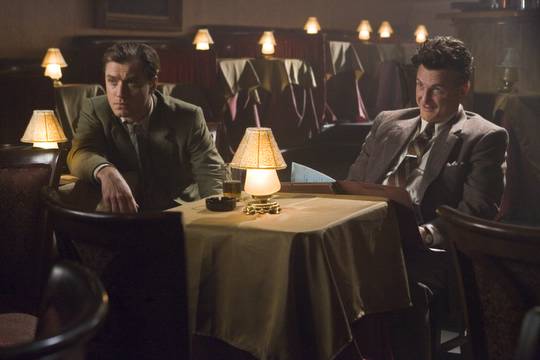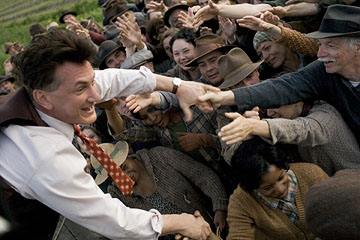“Lame Duck” Dubya and his man behind the curtain, Karl Rove, may be “inexplicably upbeat,” but John McCain is apparently contemplating suicide. Meanwhile, Dems Carville and Greenberg suggest breaking out the party credit cards, while the bellwether state of Ohio sours on the GOP completely. Only 20 days left until Election 2006…
Tag: James Carville
Beast of Burden.

Unfortunately, the reviews of Stephen Zaillan’s All the King’s Men, the second half of my Friday morning double-feature, are basically correct. The film just doesn’t work…Indeed, it’s even a bit of a stinker. I’ve never seen the 1949 John Ireland/Broderick Crawford version, so I can’t tell you how it compares to that particular Oscar-winner. But, a few ghostly wisps of Penn Warren’s prose notwithstanding, this 2006 take on the novel is, as I feared in a post one year ago today, both hopelessly miscast and remarkably pedestrian. Straining mightily for solemnity throughout its run, this Men feels leaden from the start and fails to capture the sprawling grandeur of the novel (which, I guess, some literary critics hate. I for one love the book — it’s one of my all-time favorites, and not just for the failed historian digression.) If you’ve never read All the King’s Men, trust me — you’ll want to stay away from this flick. (If you have, well, you probably want to stay away too.)
Loosely based on the life of Louisiana’s Huey Long, All the King’s Men follows the trajectory of one Willie Stark (Sean Penn, way off), an earthy and ambitious backcountry politician with big city hungers and national dreams. (Consider him the Tommy Carcetti of his day.) In the midst of running a doomed gubernatorial campaign — designed by political insiders Tiny Duffy (James Gandolfini) and Sadie Burke (Patricia Clarkson) to split the hick vote and thus elect the favored candidate of the powers-that-be — Starr finds his populist voice and manages to capture the State House on a platform of less corporate graft and more roads, schools, and libraries for the people. But, once in office, the lure of power aggravates Stark’s more misanthropic tendencies, and (though this film barely explains how) the new governor begins to enact his redistributive policies with increasingly little regard for democratic niceties.
Along for the ride is our embittered narrator, Jack Burden (Jude Law, also way off but, surprisingly, closer to the mark than Penn). A slumming scion of Louisiana’s elite turned disaffected journalist (and functioning alcoholic), Burden, who relishes playing the world-weary observer, becomes Stark’s right-hand man despite himself. But, involvement, like, power, carries its own price. Soon, to accommodate Stark’s growing political appetites, Burden finds he must not only reenter but betray the past he thought he’d earlier burned away, whether it be by digging up dirt on his magisterial godfather, Judge Irwin (Anthony Hopkins, on autopilot), convincing his best friend (Mark Ruffalo, zombielike) to sign up under Stark’s employ, or allowing his youthful sweetheart (Kate Winslet, strangely bad) to herself come under Stark’s thrall.
To the film’s credit, the movie attempts to spend as much time on Burden’s arc as it does on Stark’s, as it should. But the two halves of the tale seem almost wholly separate here — Stark disappears for the middle third, when Burden’s backstory takes center stage. And that’s just the start of what’s wrong here — Simply put, everything just seems off. Penn is wholly unbelievable (and virtually inscrutable) as Stark, Law doesn’t serve much better as Burden. Other actors (Hopkins, Ruffalo) seem bored, others still (Gandolfini, Clarkson) are given too little to do. Accents are consistently mangled throughout. James Horner’s score is intrusive to say the least. Plot details are consistently elided over to the point of the story barely making sense (Why, for example, is Stark being impeached? One gets no clue in this version.) And Zaillan’s hamhanded directing stops the movie dead all too many times (the most egregious case being in the final moments, with the Louisiana seal — you’ll see what I mean.) Even the period is off: The novel takes place during the Depression, but for reasons that never become apparent we begin our tale here in 1954. If it ain’t broke, people…
The sole redeeming grace of this version of All the King’s Men are the occasional literary flourishes from the book, which are usually given by Jude Law in voiceover. Only in these brief moments, and only imperfectly, can we sense the endless jiggers of whiskey, the cedary scent of spanish moss, the lingering sweat and grinding despair that characterize Penn Warren’s novel. Whether it be Willie’s path to power or Jack’s remembrances, All the King’s Men is about more than just a political rise and fall. As befitting its author’s role in the southern agrarian literary movement, curdling at the novel’s heart is a lament for the days of yore and a futile raging against the inexorable indignities of time. The past passes: It marks us forever and can neither be escaped nor reclaimed as it was — it can only be confronted and accepted. “Man is conceived in sin and born in corruption and he passeth from the stink of the didie to the stench of the shroud.” Zaillan’s film version does make a meaningful attempt to capture these crucial elements of the book, but, alas, like Willie himself, its reach far exceeds its grasp.

James Without Frontiers.
The new teaser for The Assassination of Jesse James by the Coward Robert Ford, starring Brad Pitt and Casey Affleck as the titular gunslinger and coward respectively, is now online. Out this September, the film also stars Sam Shepard, Sam Rockwell, Zooey Deschanel (Yes, Zaphod and Trillian), Mary-Louise Parker, and what would a hard-boiled western these days be without Garret Dillahunt?
Beware GOP bearing gifts.
Still trying to get ahead of the Abramoff story, the House GOP unveil their new anti-lobbying bill. The package includeds “the banning of privately sponsored travel” (so long, Scotland boondoggles), as well as “a virtual ban on gifts, except for inconsequential items like baseball caps, and a provision that will affect few people: elimination of congressional pensions for anyone convicted of a felony related to official duties…One important part of the GOP plan would increase — from one year to two years — the waiting period before former lawmakers and senior staff members could lobby Congress.” Common Cause’s response: Sounds like a good start, but let’s talk enforcement. As for the Dems, they’ll announce their own plan — with a stricter gift ban — later this week.
Update: “Today we as Democrats are declaring our commitment to change, change to a government as good and as honest as the people that we serve.” The Dems announce their own reform plans, which “go further than the Republicans’ proposals. Rather than limiting the value of a gift to $20, as House Republicans are considering, Democrats would prohibit all gifts from lobbyists….Lawmakers would have to publicly disclose negotiations over private-sector jobs…House and Senate negotiators working out final versions of legislation would have to meet in open session, with all members of the conference committee — not just Republicans — having the opportunity to vote on amendments. Legislation would have to be posted publicly 24 hours before congressional consideration.” And, as bc posted in the comments, James Carville and Paul Begala have offered their own comprehensive campaign finance-ethics plan, which involves public financing of candidates and a total ban on incumbent fundraising. Now that’s the type of bold, outside-the-box thinking I’d like to see more of right now. Particularly given that, as the Washington Post pointed out, the GOP ethics bill won’t work at all unless it’s coupled with serious campaign finance reform.
Open War.
With the Social Security fight looming on the horizon, Dems and the GOP clash over ethics in the House and both abortion and the minimum wage in the Senate. (Salon‘s Tim Grieve exposed the fraudulence of the Santorum “alternative” minimum wage plan yesterday.) Speaking of Social Security, several prominent Dems — including James Carville, Stan Greenberg, and Harold Ickes — advise our side to produce an alternative reform plan to Dubya’s private accounts, and soon.
Aftermath.
“Let’s put our heads together, and start a new country up…” Well, it’s been a week. So now what? Howard Dean says put me in charge (Sure, he can’t be worse than McAuliffe), James Carville says let’s find a new story (and Keep It Simple, Stupid), and John Kerry, well, he’s “fired up” about returning to the Senate (?)…and has started contemplating a 2008 run.
Unscripted K-os?
Max of Lots of Co. points the way to this intriguing article on the pitfalls that have befallen K Street. I finally saw a few episodes at a friend’s house and, while James and Mary came off well, I thought the show suffered from a few strategic errors. For one, as this story points out, the only people who will recognize (or will care about) all the uncredited cameos are the same ones who’ll realize how ultimately fake the show is. For another, the show’s greatest strength was that it seemed news-dependent, but…if you have no news for a few weeks, trouble ensues. (Hence, the not-very-engaging personal subplots that have taken over.) Still, I think there’s definite potential for a show like K St.…perhaps Soderbergh & co. should try a second run a little closer to election time, if HBO wills it.
Alphabet City.
So the big TV story in Blog Nation and elsewhere today is K Street. With this and Carnivale, I now really wish I had HBO, but ah well. At any rate, I for one am rooting for K St., not only ’cause I’m big fans of all involved, but also because there’re many politicians out there (Orrin Hatch, for example) who only recognize the worth of a given position if they hear themselves saying it. (Take, for example, the debate wrought by Soderbergh’s own Traffic.) I do think, however, that the quick turnaround time between episodes will cause problems in the later going…not only is it often hard to get pols to commit their schedules so quickly, but the show is one controversial moment away from being on the butt-end of a freeze-out sponsored by some touchy soul like Tom DeLay. Nevertheless, it sounds like a fascinating show well worth watching, even if the life it depicts is considerably less glamorous and frenetic than it lets on.
Special K.
The NY Times delves into K Street, the new life-meets-art political show brought to you by Clooney, Soderbergh, Carville, and Matalin. Should be interesting, if nothing else.
Planning Ahead.
While I’m loath to link to these guys given the trouble Klayman caused back in the day, Judicial Watch gets a hold of Cheney Energy Task Force briefings from March 2001 and finds…maps of Iraq? (Via Pigs and Fishes.)
